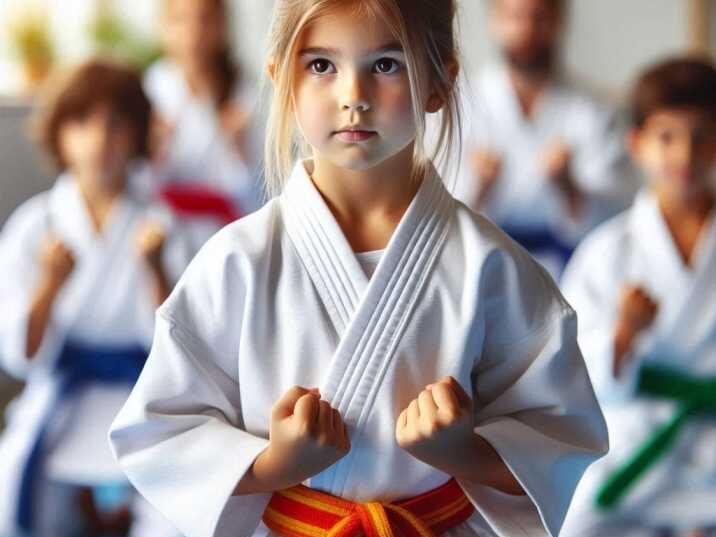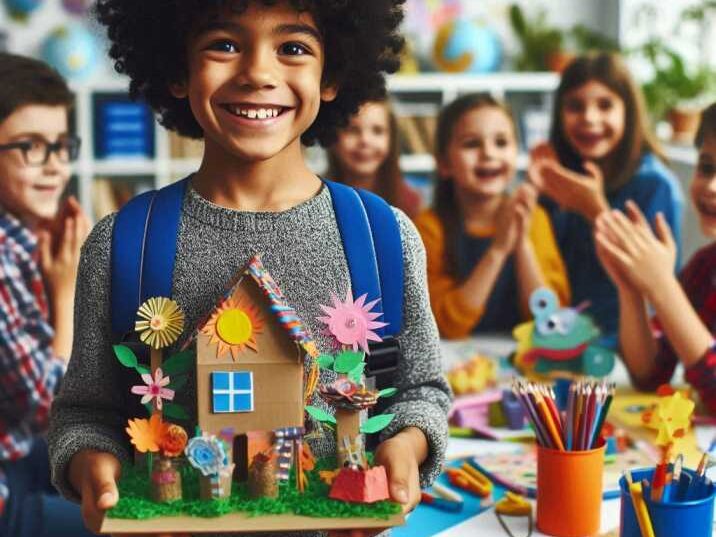Introduction
Table of Contents
Every parent wants their child to grow up confident, happy, and ready to take on life’s challenges. But confidence doesn’t just appear overnight—it’s built slowly through experiences, encouragement, and the right activities.
For kids, confidence building activities are more than just games or exercises. They’re steppingstones toward developing self-esteem, resilience, and independence. When children believe in themselves, they are better at making friends, handling challenges, and achieving their goals.
In today’s world, where kids face peer pressure, social media, and school stress, teaching confidence has never been more important. The good news? Parents can easily weave confidence-boosting activities into daily routines—whether through play, sports, martial arts, or creative outlets.
Let’s explore the best confidence building activities for kids that are both fun and life-changing.
What Does Confidence Building Mean for Kids?
Confidence building simply means helping children feel good about themselves and their abilities. It’s not about making kids think they’re perfect, but about teaching them to trust their skills, bounce back from setbacks, and try new things without fear.
When kids gain confidence, they:
- Believe in their ability to learn and succeed.
- Are more willing to step outside their comfort zone.
- Build healthier friendships and relationships.
- Handle failure with resilience instead of giving up.
Confidence isn’t something children are just born with—it’s something they practice and grow through daily experiences.
Benefits of Confidence Building Activities for Kids
Confidence building activities come with powerful benefits that affect every part of a child’s life:
1. Improved Academic Performance
When children believe they are capable, they approach schoolwork with excitement instead of fear. Confidence makes them more willing to try new things, ask questions, and take risks in learning. Even when mistakes happen, confident kids see them as lessons, not failures. This positive mindset naturally leads to stronger academic results.
2. Better Social Skills
Kids with confidence are more comfortable joining group activities, starting conversations, and expressing their ideas. They don’t shy away from making friends or participating in class. As a result, they build stronger relationships and feel more included. These skills help them navigate social situations with ease both in school and at home.
3. Stronger Emotional Resilience
Life brings challenges like rejection, bullying, or losing a game, but confident kids handle these setbacks with strength. Instead of giving up, they learn to try again and push forward. Confidence helps them manage disappointment without losing motivation. Over time, this resilience prepares them to face bigger challenges as they grow.
4. Encourages Independence
When kids believe in themselves, they’re more willing to take on tasks without constant parental guidance. Simple things like making their own lunch, doing chores, or solving problems alone build independence. This sense of responsibility makes them feel capable and trusted. It also prepares them for future situations where they’ll need to rely on their own judgment.
5. Positive Self-Image
Confidence helps kids see their value and strengths instead of focusing only on their weaknesses. Through positive activities, they begin to accept themselves for who they are. They celebrate progress, no matter how small, and develop pride in their efforts. This healthy self-image lays the foundation for lifelong self-esteem and happiness.
Risks and Concerns Parents May Have
Parents often wonder if pushing kids into confidence activities could backfire. Here are some common concerns:
Fear of Pressure
When kids feel too much pressure to perform or achieve, activities can become stressful instead of enjoyable. Instead of building confidence, they may start fearing failure or comparing themselves to others. Parents need to emphasize fun and growth, not just results, to keep kids motivated and happy.
Risk of Failure
Failure is a natural part of learning, but some children may feel discouraged if they don’t succeed right away. This can temporarily lower their self-esteem or make them hesitant to try again. Parents should normalize mistakes as steppingstones, reminding kids that progress takes time and effort.
Overconfidence
While confidence is positive, too much of it can sometimes lead to arrogance or carelessness. Overconfident kids may ignore rules, dismiss teamwork, or take unnecessary risks. The key is teaching balance—encouraging pride in achievements while also promoting humility and respect for others.
👉 The solution? Choose age-appropriate, fun, and encouraging activities. Always focus on effort and progress, not perfection, to make sure confidence grows in a healthy, balanced way.
15 Best Confidence Building Activities for Kids
Here’s a deeper look at the most effective activities to help children grow in self-esteem and resilience.
1. Martial Arts Training 🥋
Martial arts like karate, taekwondo, and judo are incredible confidence boosters. Every class teaches kids discipline, focus, and respect—while also improving their fitness. The belt system in martial arts helps children see progress step by step. Each new belt represents hard work, persistence, and growth.
The real beauty of martial arts is how it teaches resilience. Kids learn that mistakes are part of the journey, and success comes through practice. They also develop valuable self-defense skills, which make them feel safe and capable.
👉 Best for ages 5+

2. Team Sports ⚽
Sports like soccer, basketball, and baseball build teamwork and leadership. Kids learn how to cooperate, communicate, and celebrate success together. Even when they lose a game, they gain resilience and learn to try harder next time.
For shy kids, joining a team can feel intimidating at first. But with encouragement, sports become a safe space to make friends and practice social skills. The sense of belonging and being “part of the team” gives kids a huge confidence boost.
👉 Best for ages 6+
3. Public Speaking Games 🎤
Standing in front of others can feel scary—but practicing in small, fun ways helps kids overcome fear. Start with simple activities like “Show and Tell” at home or reading aloud to family members. As confidence grows, encourage short presentations at school or in community groups.
Public speaking teaches kids how to express themselves clearly, make eye contact, and believe in their voice. These skills benefit them in school presentations, interviews, and later in life.
👉 Best for ages 5+
4. Creative Arts 🎨
Art is more than coloring or painting—it’s a powerful outlet for self-expression. Kids who struggle to put feelings into words often find comfort in drawing, painting, or crafting. Each finished piece gives them a sense of accomplishment.
Art also encourages risk-taking. Trying new techniques or experimenting with colors teaches kids to trust their creativity without worrying about being perfect. Parents can help by proudly displaying artwork at home, which reinforces confidence.
👉 Best for all ages

5. Role-Playing and Pretend Play 🎭
Pretend play allows kids to step into different roles—superheroes, doctors, explorers, or even parents. Through role-play, children practice problem-solving, decision-making, and social skills in a safe environment.
When kids act out stories, they’re learning how to think creatively and express themselves. Pretend play also encourages empathy, since they imagine how others feel. These skills directly boost confidence in both social and academic settings.
👉 Best for ages 3–8
6. Volunteer Activities ❤️
Helping others makes children feel valuable and capable. Simple activities like donating toys, planting trees, or helping at a local event teach kids that their actions matter.
Volunteering not only builds confidence but also teaches empathy and kindness. Kids see the positive impact of their contributions, which boosts their self-worth and sense of responsibility.
👉 Best for ages 7+
7. Learning a New Skill 🎸
Whether it’s baking, riding a bike, playing guitar, or coding, mastering a new skill teaches kids perseverance. The journey from “I can’t do this” to “Look what I can do!” is one of the strongest ways to build confidence.
Parents should encourage exploration, letting kids pick a skill they’re excited about. The sense of accomplishment they feel when they finally master it will stay with them forever.
👉 Best for ages 6+
8. Outdoor Adventures 🌲
Hiking, camping, or exploring nature challenges kids in new ways. They might face muddy trails, build a tent, or climb a hill. Each small success makes them feel braver and more capable.
Outdoor adventures also reduce stress, improve mood, and strengthen resilience. When kids spend time in nature, they learn problem-solving and independence while staying active.
👉 Best for ages 5+
9. Daily Chores 🧹
Simple household responsibilities—like setting the table, feeding pets, or watering plants—teach kids that they are capable of contributing to the family.
When kids take responsibility, they feel needed and important. This builds independence and confidence. To make chores fun, parents can create reward charts or celebrate milestones with small praises.
👉 Best for ages 3+
10. Positive Affirmations 💬
The words kids hear and repeat shape their inner beliefs. Teaching children affirmations like “I can do hard things” or “I am strong and kind” helps build a confident mindset.
Parents can make affirmations a daily routine by saying them together in the morning or before bedtime. Over time, these positive statements replace negative self-talk and boost resilience.
👉 Best for all ages
11. Journaling ✍️
Writing about feelings, successes, or challenges helps kids process emotions and reflect on their progress. A journal becomes a safe place where they can express themselves without judgment.
For younger kids, journaling can be as simple as drawing pictures or writing short sentences. For older kids, gratitude journals help them focus on positives and appreciate their growth.
👉 Best for ages 6+
12. Building Projects 🛠️
Legos, puzzles, or DIY kits teach kids patience, problem-solving, and determination. Every completed project represents persistence and creativity.
Parents should encourage trial and error, reminding kids that mistakes are part of learning. This helps children gain confidence not only in building projects but also in handling real-life challenges.
👉 Best for ages 5+

13. Dance and Movement 💃
Dance encourages self-expression and body confidence. Whether kids join a dance class or just move freely to music at home, they learn to trust their bodies and enjoy the process.
Group dance classes also build teamwork and social confidence. Kids practice performing in front of others, which helps reduce stage fright and shyness.
👉 Best for ages 4+
14. Reading Stories of Role Models 📚
Children learn through stories. Reading books about strong, resilient characters inspires kids to believe in their own abilities.
Role models don’t have to be superheroes—real-life figures like athletes, inventors, and leaders can also motivate kids. After reading, parents can discuss what the child learned about courage and confidence.
👉 Best for all ages
15. Mindfulness and Yoga 🧘
Simple breathing exercises and yoga poses help kids calm their minds and focus. Mindfulness teaches them how to handle stress, stay grounded, and approach challenges with a clear head.
Over time, mindfulness builds self-awareness and confidence. Kids learn that they can control their reactions and emotions, making them feel more capable in daily life.
👉 Best for ages 4+
Safety Tips for Confidence Building Activities
To make sure activities stay fun and safe:
Start Small
Begin with easy, age-appropriate activities that your child can manage successfully. Small wins help build momentum and make them eager to try harder challenges later. Gradual steps prevent frustration and keep confidence growing at a steady pace.
Encourage, Don’t Pressure
Praise your child’s effort rather than focusing only on results. When kids feel pressured to succeed, they may become anxious or lose interest. Encouragement makes the process enjoyable and shows them that trying is just as important as winning.
Model Confidence
Children learn best by watching parents. If you handle mistakes with a smile and keep trying, they’ll copy your positive attitude. Showing them that setbacks are normal teaches resilience and self-belief.
Provide a Safe Space
Let your child experiment, make mistakes, and try again without criticism. A supportive environment allows them to take risks without fear of failure. This freedom is essential for real growth in confidence.
Balance Activities
Mix structured activities like martial arts or sports with free, creative play such as drawing or role-playing. A balanced approach helps kids explore different strengths while avoiding burnout. This variety keeps learning fun and exciting.
Comparison Table: Benefits vs. Risks
| Activity Type | Benefits 🌟 | Risks ❌ | Best For 👧🧒 |
|---|---|---|---|
| Martial Arts | Discipline, respect, resilience | Risk of minor injuries | Ages 5+ |
| Team Sports | Teamwork, leadership, confidence | Pressure to perform | Ages 6+ |
| Creative Arts | Expression, self-love, imagination | Mess or frustration | All ages |
| Public Speaking | Communication, bravery, self-esteem | Nervousness or stage fright | Ages 5+ |
| Mindfulness & Yoga | Calmness, focus, self-awareness | Restlessness in some kids | Ages 4+ |
Conclusion
Confidence isn’t just about standing tall—it’s about believing in oneself. Through simple, everyday confidence building activities for kids, parents can give their children the tools to face challenges, make friends, and grow into resilient young adults.
Whether it’s martial arts, creative play, or outdoor adventures, the goal is the same: helping kids see their own potential. Remember, the journey is just as important as the outcome. Encourage your child, celebrate progress, and watch their confidence soar.
✨ Confidence is the gift that lasts a lifetime—start building it today!
FAQs About Confidence Building Activities for Kids
1. What age should kids start confidence building activities?
Confidence building can start as early as preschool. Simple activities like pretend play or chores are perfect for young children.
2. Do confidence activities really work for shy kids?
Yes! Gentle encouragement and fun activities like martial arts or creative arts help shy children open up over time.
3. Can sports alone build confidence?
Sports are powerful, but combining them with creative and reflective activities gives the best results.
4. How can parents encourage confidence daily?
Praise effort, give small responsibilities, and model positive self-talk in everyday situations.
5. Are martial arts good for building confidence?
Absolutely! Martial arts promote discipline, respect, and achievement, which naturally build confidence.


